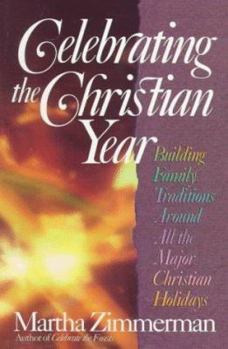Celebrating the Christian Year
Describes the major Christian holidays and shows how to make each one a family celebration.
Format:Paperback
Language:English
ISBN:1556613490
ISBN13:9781556613494
Release Date:January 1993
Publisher:Bethany House Publishers
Length:205 Pages
Weight:0.58 lbs.
Dimensions:0.6" x 5.4" x 8.3"
Customer Reviews
3 ratings
A Must Have For You and Your Family
Published by Thriftbooks.com User , 23 years ago
This book takes a Christian approach to the major holidays and tells us a history behind each one. Learn about the well-known holidays such as St. Valentine's Day, Easter, Halloween, Thanksgiving, and Christmas and learn about the other Christian holidays such as St. Lucia Day, Shrove Tuesday, Lent, Ascension Day, and many others. This book also features recipes and crafts that you and your family can partake in. Also featured are great suggestions how to celebrate each holiday so that you and your family can better understand their meaning and purpose. A Lectionary can be found at the back of the book, giving you Scripture readings for the Sundays and the special days of the Christian year. A must have book for you and your family. Make the holidays more special and meaningful--read this book.
A good resource
Published by Thriftbooks.com User , 25 years ago
This book is filled with solid advice and interesting ideas for celebrating the holidays of the Christian year. I was especially impressed that Ms. Zimmerman didn't shy away from advising Christians to celebrate such holidays as Halloween, which is currently pooh-poohed in some Evangelical, Fundamentalist, and even some Catholic circles as "demonic". She would explain how Christians could reclaim the holiday from the crackpots and neo-pagans and I found that refreshing.Which was why I was puzzled at her undue scrupulosity in insisting that Easter should not be called by its traditional English name because that name "Easter" was supposedly derived from pagan goddess worship. It was used in connection to a pagan spring festival but words in and of themselves are neutral and cannot be "pagan." Only the meanings we assign to them can.According to Catholic apologist James Akin, the word actually comes from the prehistoric West Germanic word akin to the Old English term for "east," the direction of the rising sun. It makes sense that early Christians claimed it as their own because they had a reverence for the direction, east, having their houses built facing east and being buried facing east because it was thought that the Second Coming of the Lord would be from the east. As previously mentioned, it is also the direction of the rising sun, recalling the images of Jesus as the Light of the World and the prophesy of the Resurrection in Malachi 3:20 about the Sun of Justice.With that rich history, why would anyone balk that a simple word had once been used in connection to a pagan spring festival and not rejoice that Christians claimed it, emptied it of any former pagan meaning, and used it to express Christian truth? In comparison to that, I can only roll my eyes at Ms. Zimmerman's suggestion to rename Easter "Resurrection Day".Overall, the book was very good. I only wish that Ms. Zimmerman had been more consistent. At the same time she denounced the term "Easter" she recommended families go to sunrise services, which of course face the east in order to watch the rising sun.
Informative and Practical
Published by Thriftbooks.com User , 25 years ago
This book not only gives historical background of holidays; it defines which part of our current celebrations are based on Christian tradition, and what is based on pagan traditions. Families are encouraged to reclaim holidays. Practical suggestions are given for changing the way we celebrate. This is a "must have" for every Christian family looking to have meaningful celebrations throughout the year.






